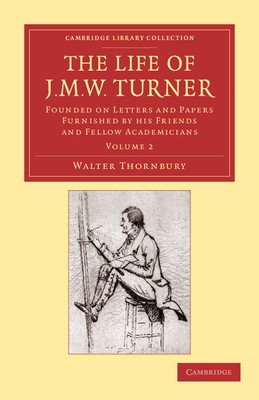
- We will send in 10–14 business days.
- Author: Walter Thornbury
- Publisher: Cambridge University Press
- ISBN-10: 1108059430
- ISBN-13: 9781108059435
- Format: 14 x 21.6 x 2.5 cm, minkšti viršeliai
- Language: English
- SAVE -10% with code: EXTRA
Reviews
Description
This pioneering two-volume biography, first published in 1862, explores the genius of the groundbreaking Romantic landscape and historical painter J. M. W. Turner (1775-1851). As both journalist and historian, author Walter Thornbury (1828-76) has a light touch, yet he draws on a wide range of correspondence, sketchbooks, watercolours and etchings to give a detailed picture of Turner's artistic development and connections, and his increasingly eccentric character. Volume 2 fills out the record by detailing the artist's relationships with patrons such as Lord Egremont of Petworth House, and such fellow Royal Academicians as the sculptor Sir Francis Chantrey. Among the topics covered here are Turner's love of poetry, dealings with buyers, miserliness (or otherwise), the tailing off of his powers, and his final mysterious metamorphosis into 'Admiral Booth'. Advised by Ruskin not to try to 'mask the dark side' of his subject, Thornbury presents a rounded but still admiring picture of his hero.
EXTRA 10 % discount with code: EXTRA
The promotion ends in 21d.05:25:44
The discount code is valid when purchasing from 10 €. Discounts do not stack.
- Author: Walter Thornbury
- Publisher: Cambridge University Press
- ISBN-10: 1108059430
- ISBN-13: 9781108059435
- Format: 14 x 21.6 x 2.5 cm, minkšti viršeliai
- Language: English English
This pioneering two-volume biography, first published in 1862, explores the genius of the groundbreaking Romantic landscape and historical painter J. M. W. Turner (1775-1851). As both journalist and historian, author Walter Thornbury (1828-76) has a light touch, yet he draws on a wide range of correspondence, sketchbooks, watercolours and etchings to give a detailed picture of Turner's artistic development and connections, and his increasingly eccentric character. Volume 2 fills out the record by detailing the artist's relationships with patrons such as Lord Egremont of Petworth House, and such fellow Royal Academicians as the sculptor Sir Francis Chantrey. Among the topics covered here are Turner's love of poetry, dealings with buyers, miserliness (or otherwise), the tailing off of his powers, and his final mysterious metamorphosis into 'Admiral Booth'. Advised by Ruskin not to try to 'mask the dark side' of his subject, Thornbury presents a rounded but still admiring picture of his hero.


Reviews